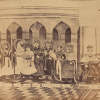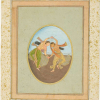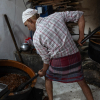Interviewer: What is your name?
Gurumayee Remevati: Remiya. Remevati. My village is Erandwala.
I: What you write your name as? Remevati Bagel? (To understand if she identifies herself as a tribal)
GR: No, Remevati Nag.
I: So are you a Dhurva?
GR: No, I’m a Kalar. (Kalars identify themselves as OBCs. They live in the same villages and are an integral part of the community.)
I: How many years have you been doing this for?
GR: 20 years
I: Who taught you how to sing?
GR: Mother (referring to the Goddess). While my mother (actual mother) taught Hemvati and Hemvati taught me. (The oldest Gurmayi of the group is called Hemvati and is sitting in the room, across from Remevati).
I: This is long back?
GR: Yes, long back.
GR: And I in turn, taught Belmati. (Belmati is the youngest in the group. She appears later to sing a song with Remevati).
I: Who do you sing praises of? Which God?
GR: Sudra Dai (Sudra Devi is the chief Goddess of this village). Loh Jarin is who I will pray to.
I: So Lakshmi’s name also comes up?
GR: This is a Lakshmi jagaar, so yes her name also comes. (The jagaar is a religious ceremony that commemorates Goddess Lakshmi, but all Gods, especially the chief one of a village are invoked).
I: Who told you to become a Gurmayee? Did the Gods tell you to do this?
GR: This is a jug (ancient) thing. The Goddess told me to become a Gurmayee. The mother (Goddess) knows who should become a Gurmayee. She alone knows that who should become a Gurmayee. (The tradition is passed on from generation to generation)
GR: When people organise a jagaar, they need us. So I take care of 7 paras (regions). People honour us by offering us stay, food
I: Do you go up to Chhote Kadma village?
GR: I go to all of them. Not only seven paras, but even further. If someone wants me to go to different places, there is no problem. I could go.
I: Which all villages do you go to?
GR: Chitapur, Rajgir, Parapa, Erandwala is my home, Kadma.
I: What about the ones outside the para?
GR: No, so I don’t go out of the para, but I invoke the Gods from all over Bastar. I go to all the jagaars of my region. Whoever calls me. What happens in a jagaar is that Gods from all 84 parghanas (cluster of 20-30 villages makes for 1 pargahana) are invoked. Ganga, Godavari, Kashi, Puri, Gaya, Vijaynagar, Salur – all of the regions where Raja (Lord Vishnu) went, we sing about Gods from that region.
I: So you invoke Gods from all these regions?
GR: Yes, all of Bastar. (She mentions places outside of Bastar as well). Gods of all the places. From different kingdoms; Rajbindri, Ghokara, Allahabad, Nanbandar, Godebandar, Ramgarh, Ramgiri, Pratappur, Goda, Ohri, Panchkoti – people from all of these villages call me.
I: So you’re naming the 84 parghanas.
GR: Yes, all 84.
I: But all the parghanas have their own Gods.
GR: Yes. We invoke all of them. Basapura, Bijapur, Patna, Nani Dongar, Bade Dongar, Chhote Dongar, Keshkal, Telanghati, etc. She continues to name more villages and regions.
I: Tell us more about the process of becoming a Gurmayee.
GR: The Goddess speaks to me and gives me her word. She also gives me the words for the songs.
I: So does she come in your dream and tell you to become a Gurmayee.
GR: Yes. The Goddess is actually a Guru, and we have a direct connection. And I have to take it from her. It was the older generation that knew all the songs. Hemvati taught me, and now she is old, so I lead the entire jagaar. I’m teaching Belmati now so she can take it forward.
I: So who told you? The God told you, sirha (village witchdoctor) told you, or you wanted to start on your own?
GR: No, I didn’t start on my own. Only when Dev and Devis say so, we start. They only tell us. When I’m told by the Gods is only when I get a Guru. Then the Guru taught me.
I: So Hemvati is old now, so you lead it?
GR: Yes, she is old now. That’s why I lead it and now I’m teaching Belmati.
I: When you’re not doing this back in your village Erandwala, what do you do?
GR: I do farming, labour work or just house chores. My husband goes out to tend to the fields. Not so big – just 3-4 acres.
I: What do you grow in your home?
GR: We grow paddy, wheat, corn, but the main thing is rice. I sing a song for that too.
GR: It’s been seven years that my older son got married.
I: So you have a daughter-in-law and two grand children. (The interviewer tells her in a lighthearted manner that she doesn’t need to work now.)
I: When you stay in the village and not play the role of Gurmayee, so you still get so much respect? Or is only the time of the jagaar?
GR: Yes, they are very respectful.
I: Please don’t mind us asking this. The work that you do is socially much higher than your husband. You’re singing for the Gods, you’re closer to the Gods and he is tending to the land. Is that ever a problem? Is he supportive?
GR: Yes, yes, he is very supportive. He also comes and listens to the jagaar.
I: What is your role when a jagaar starts?
GR: We go and start with a prayer to the sanctum, to all the Gods, then settles the two rice pots and the things around it, keep the dhonu and chiriya (instruments). I only do it.
I: The village people don’t do it?
GR: The village people help out and keep everything ready, but we settle it to start.
GR: The songs are about the entire life of Maha Lakshmi and the episodes within. So all major things like being born, being a girl, getting married, having a baby – we celebrate that in the form of songs.
Note: During the jagaar days, detailed ceremonies are held covering all episodes. For example, when Maha Lakshmi is depicted as giving birth, everything from inducing labour pains and cutting the umbilical cord is shown.
I: So sirhas also help start the ceremony.
GR: Yes, they are also there. Sirhas of the para sit together and decide which village should be the venue of the jagaar.
I: So who tells you that today you have to fast, or this is what you have to do?
GR: This fasting depends on the days and episodes of the jagaar. On all major occasions – birth (Mahasatti), wedding, first day, last day (Bade jagaar) and such. We eat only late into the night after the puja is over for the day
After the jagaar, we also take Lakshmi to the cultivation land and then immerse in the water as well. First we bring the soil from the fields to the gudi, and the taken it back after it is blessed. That’s how the jagaar ends.
(The interviewer asks her to sing a little)
The song is about telling Raja and Lakshmi that the village is starting the jagaar, and asks them to bless the ceremony. They call him Rajapati or Deshpati out of respect. The song continues to explain how this is being held in the Dhurva land and the soil of the place. They ask for putra-putri, blessings and prosperity in the form of good harvest.












